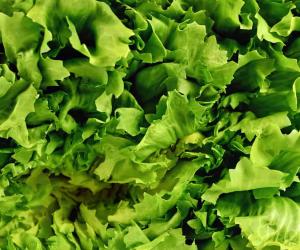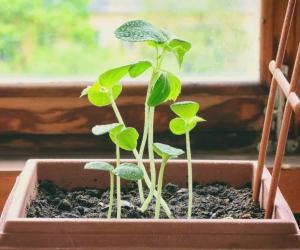7 Great Benefits of Using Epsom Salt on Your Roses
Are you a looking to boost the beauty and vitality of your prized blooms? Look no further than ! This simple, affordable, and readily available garden secret can work wonders for your roses.
Epsom salt, chemically known as magnesium sulfate, contains two essential nutrients: magnesium and sulfur. These mighty elements play a crucial role in nurturing healthy roses. Magnesium aids in the activation of vital plant enzymes, promoting photosynthesis and overall growth. Meanwhile, sulfur helps in the production of essential amino acids, which are the building blocks of proteins – the very stuff that makes roses sturdy and vibrant.
So, what can Epsom salt do for your roses? Let’s find out! The following are some great reasons to give Epsom salt a shot for your roses. We’ll also include some cautionary reasons why you might want to avoid Epsom salt as a rose treatment as well.
1. Magnesium Boost
Epsom salt can be a valuable treatment for roses due to its ability to provide a magnesium boost. Magnesium is an extremely important nutrient for plants, including roses, as it plays a pivotal role in the photosynthesis process, enzyme activation, and the overall health of the plant.
Roses often suffer from magnesium deficiency, which can manifest as yellowing leaves, poor flower development, and reduced growth. Epsom salt, when applied to the soil, can rectify this issue effectively. The magnesium in Epsom salt is readily absorbed by the rose’s roots, aiding in chlorophyll production. This, in turn, promotes lush green foliage and vibrant, colorful blooms.
To apply Epsom salt to roses, dissolve about two tablespoons of Epsom salt in a gallon of water and water the plants with this solution. Alternatively, you can sprinkle a handful of Epsom salt around the base of each rose bush and gently work it into the soil.
Apart from magnesium, Epsom salt also provides sulfate ions, which improve the absorption of essential nutrients like nitrogen and phosphorus. This enhanced nutrient uptake further boosts the overall health and vigor of the rose plants.
2. Improved Nutrient Uptake
Epsom salt is an effective treatment for roses due to its capacity to enhance nutrient uptake, thereby promoting the overall health and vitality of these exquisite flowering plants.
Roses require an array of nutrients to thrive, and Epsom salt assists in this aspect by facilitating the absorption of essential elements from the soil. When Epsom salt is applied to the soil around rose bushes, it aids in the release of vital ions that are necessary for the plant’s growth and development. These ions are readily absorbed by the plant’s roots, ensuring that the rose can access the nutrients it needs.
One of the key ways Epsom salt contributes to rose health is by improving the uptake of essential nutrients like nitrogen and phosphorus. These nutrients are crucial for robust foliage and prolific flower production in roses. Epsom salt acts as a natural booster, ensuring that roses can efficiently absorb and utilize these nutrients from the soil.
Applying Epsom salt to roses is a simple and practical gardening practice. Gardeners can effortlessly incorporate it into their routine by dissolving a couple of tablespoons of Epsom salt in a gallon of water, which can then be used for regular watering. Alternatively, they can spread a handful of Epsom salt around the base of each rose bush and gently work it into the soil. This practice, usually carried out during the season, helps roses access the nutrients they require.
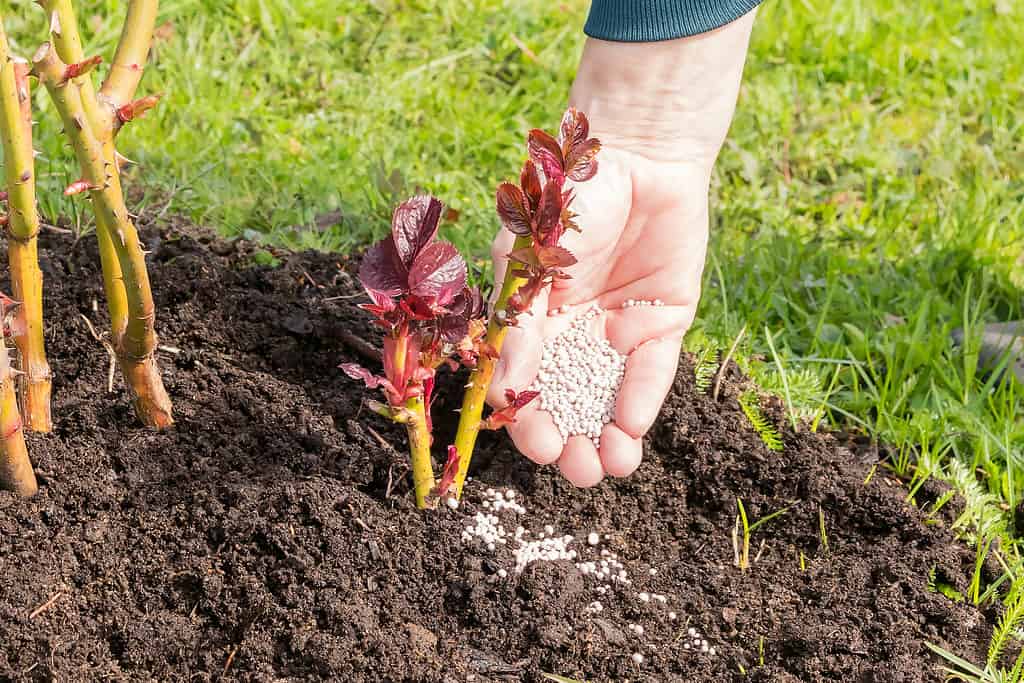
©iStock.com/Ludmila Kapustkina
3. Gets Rid of Yellowing Leaves
Epsom salt is a beneficial treatment for roses primarily because it can help prevent the unsightly issue of yellowing leaves. Yellowing leaves on rose bushes are often indicative of nutrient deficiencies or poor overall plant health. Epsom salt addresses this concern effectively.
Yellowing leaves, known as chlorosis, are typically caused by a lack of essential nutrients, particularly magnesium. Magnesium plays a pivotal role in chlorophyll production, the green pigment responsible for photosynthesis. When roses lack magnesium, chlorophyll production is hindered, leading to yellowing leaves and reduced photosynthetic activity. This not only affects the plant’s appearance but also its ability to generate energy and grow.
Epsom salt is a rich source of magnesium, and when applied to the soil around rose bushes, it provides an easily absorbed form of this nutrient. As a result, roses can access the magnesium they require to produce ample chlorophyll. This helps maintain the lush green color of the leaves, contributing to the overall aesthetics of the plant.
By preventing yellowing leaves, Epsom salt ensures that rose bushes not only look healthier but also function optimally. This, in turn, promotes better growth, more vigorous blooming, and an overall thriving garden. Gardeners often find that incorporating Epsom salt into their rose care routine is a simple yet effective way to keep their roses in top condition, free from the common problem of yellowing leaves.
4. Improved Flowering
Epsom salt is also recognized as a valuable treatment for roses primarily because of its capacity to enhance flowering. A bountiful display of colorful blooms is the hallmark of healthy and vibrant rose bushes, and Epsom salt plays a pivotal role in achieving this horticultural goal.
The improved flowering attributed to Epsom salt is linked to its role in enhancing nutrient uptake in roses. Nutrients like phosphorus and potassium are vital for flower development. Epsom salt’s ability to promote the efficient absorption of these essential nutrients from the soil ensures that roses receive the nourishment they need to produce an abundance of blossoms.
Also, Epsom salt assists in flower bud formation and overall plant vigor. By facilitating the uptake of nutrients and improving the plant’s overall health, it ensures that rose bushes have the energy and resources required to produce an impressive array of flowers. Gardeners often notice that roses treated with Epsom salt exhibit larger, more colorful, and longer-lasting blooms.
The positive impact of Epsom salt on rose flowering is particularly evident during the blooming season. Roses treated with Epsom salt tend to have a more prolific and prolonged flowering period, delighting garden enthusiasts with an extended display of fragrant and captivating flowers.
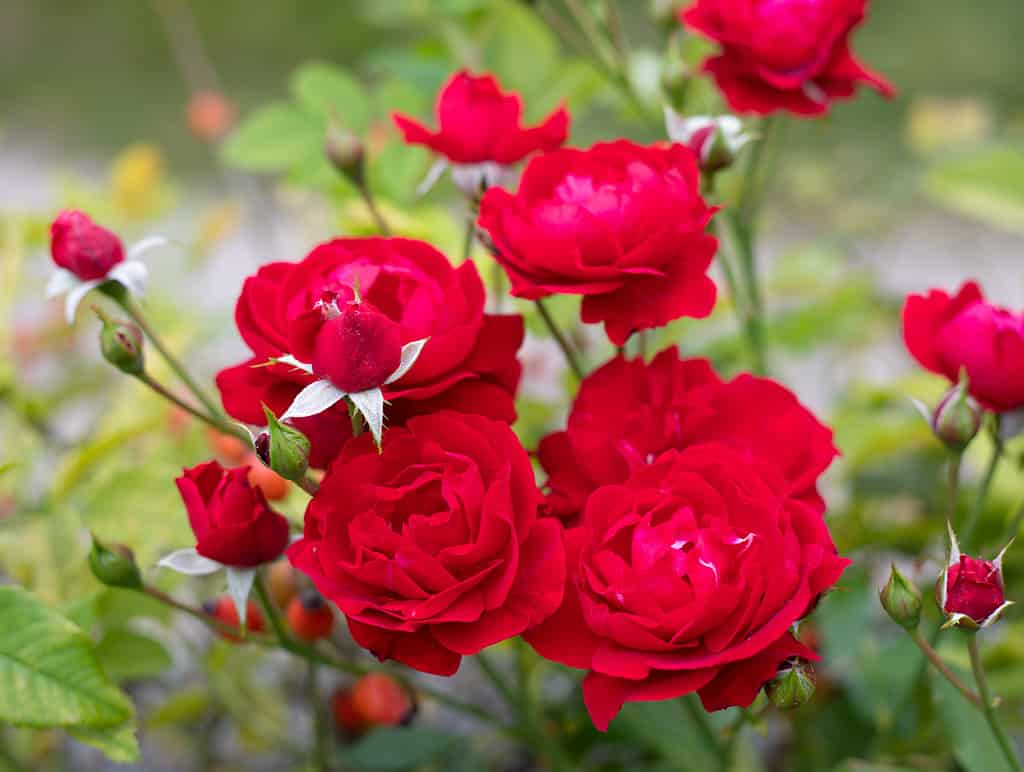
©Maria Rzeszotarska/iStock via Getty Images
5. Disease Resistance
Epsom salt serves as a valuable treatment for roses due to its potential to enhance disease resistance. Roses are susceptible to various diseases, including fungal infections, and maintaining their health is crucial for a thriving garden. Epsom salt contributes to this by bolstering the rose bushes’ natural defenses.
One way Epsom salt achieves this is by promoting robust growth. Healthy rose bushes are better equipped to fend off diseases. Epsom salt contains magnesium and sulfur, both of which play essential roles in plant development. Adequate magnesium levels facilitate photosynthesis and overall plant vitality, while sulfur aids in enzyme activation. As a result, roses treated with Epsom salt tend to have stronger stems, lusher foliage, and a more vigorous overall constitution, making them less vulnerable to diseases.
Just as well, Epsom salt can help correct nutrient imbalances in the soil. When soil lacks essential nutrients, roses become more susceptible to diseases. Epsom salt’s magnesium and sulfur content can address these deficiencies, improving the soil’s overall nutrient profile and creating an environment that is less conducive to disease development.
In addition to promoting healthy growth and nutrient balance, Epsom salt may have some antifungal properties. While it’s not a direct fungicide, it can potentially deter certain fungal diseases, contributing to improved disease resistance in roses.
By enhancing disease resistance, Epsom salt aids in maintaining the overall health and longevity of rose bushes. Healthy roses are not only more resistant to diseases but also better equipped to cope with environmental stressors, resulting in a more attractive and enduring garden.
6. Reduction in Stress
Another way that Epsom salt can be a valuable treatment for roses involves its potential to reduce stress in these flowering plants. Stress factors such as environmental conditions, nutrient deficiencies, and disease susceptibility can take a toll on rose bushes, affecting their overall health and appearance. Epsom salt provides a natural solution to mitigate these stressors.
One way Epsom salt helps alleviate stress in roses is by promoting nutrient absorption. Rose bushes require a range of essential nutrients for growth and flowering. When these nutrients are lacking or imbalanced in the soil, roses may struggle to cope with stressors. Epsom salt, rich in magnesium and sulfur, aids in nutrient uptake, ensuring that roses have the resources they need to thrive.
Also, magnesium plays a vital role in photosynthesis, the process by which plants convert sunlight into energy. Adequate magnesium levels, facilitated by Epsom salt, enable roses to efficiently produce energy, making them more resilient in adverse conditions.
Epsom salt may also play a role in disease prevention. While not a direct fungicide, it can potentially deter certain fungal infections, reducing the stress associated with disease susceptibility in roses.
By reducing stress, Epsom salt contributes to overall rose health. Stressed roses are more vulnerable to damage from pests, diseases, and environmental factors. Epsom salt helps fortify rose bushes, making them more capable of withstanding these challenges.
7. Improved Soil Structure
Lastly, Epsom salt proves to be an effective treatment for roses due to its capacity to improve soil structure, a fundamental aspect of rose plant health and growth. Soil structure influences a range of factors critical to rose cultivation, making Epsom salt a valuable ally for gardeners.
One of the primary ways Epsom salt enhances soil structure is through its magnesium content. Magnesium promotes the formation of stable soil aggregates, which are essential for soil structure. These aggregates create pores and channels in the soil, facilitating air and water movement. This improved aeration and drainage are vital for root health and overall plant vitality.
Epsom salt also aids in preventing soil compaction. Compacted soil hinders root growth and reduces the rose plant’s access to essential nutrients and water. By contributing magnesium to the soil, Epsom salt can help alleviate compaction, promoting a looser, more friable soil texture that encourages root expansion.
Also, Epsom salt may indirectly improve soil structure by enhancing nutrient uptake. When rose bushes receive the necessary nutrients in a readily available form, they tend to develop healthier root systems, which in turn help in maintaining soil structure. Stronger, more extensive root networks can prevent soil erosion and enhance overall soil stability.
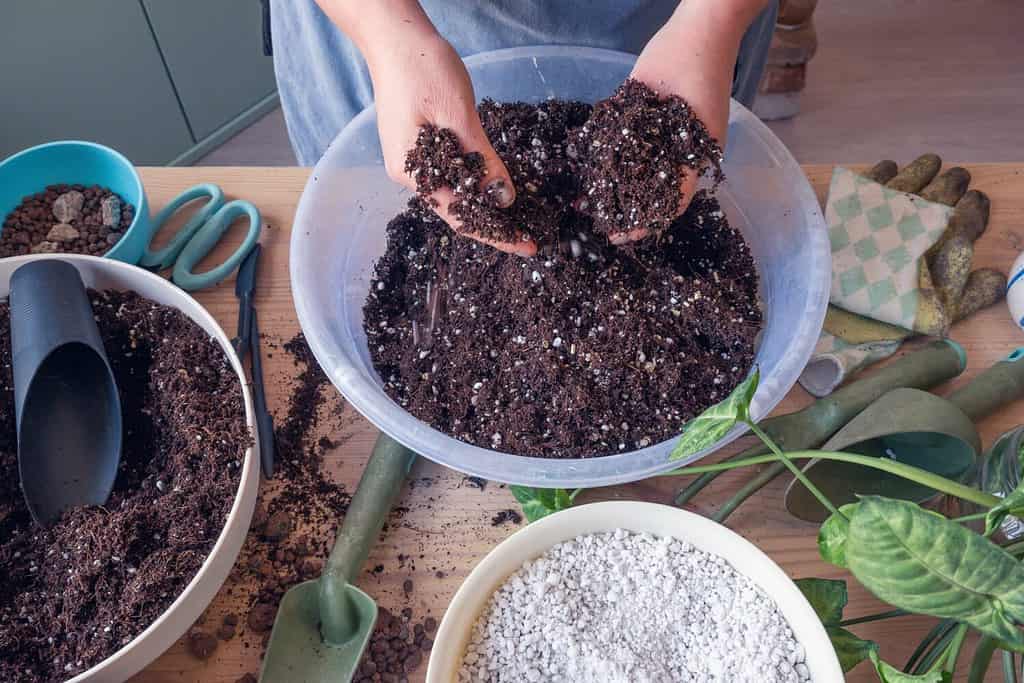
©Cem Selvi/Shutterstock.com
Potential Downsides to Using Epsom Salt on Your Roses
Epsom salt clearly has a ton of benefits for roses. However, there are some potential risks and downsides to using it that rose gardeners should consider as well.
1. Nutrient Imbalance
Epsom salt, chemically known as magnesium sulfate, contains magnesium and sulfur, two essential nutrients for plant growth. While magnesium is crucial for photosynthesis and overall plant health, roses typically require it in small quantities. Excessive magnesium can disrupt the nutrient balance in your soil, potentially leading to nutrient deficiencies in other essential elements like potassium and calcium. This imbalance can weaken your roses rather than nourish them.
2. Risk of Toxicity
Overzealous use of Epsom salt can lead to magnesium toxicity in your rose plants. Symptoms of magnesium toxicity include leaf yellowing, browning at the leaf edges, and reduced flowering. To avoid such problems, it’s crucial to conduct a soil test to determine if your roses actually need magnesium supplementation. Applying Epsom salt without knowing your soil’s magnesium levels can inadvertently harm your roses.
3. Altered Soil pH
Another concern with Epsom salt is its potential to change the pH of your soil. Roses thrive in slightly acidic to neutral soil (pH around 6.0 to 7.0). Epsom salt, being acidic in nature, can lower the soil pH over time. This shift towards acidity might not suit your roses’ preferences and could hinder their growth and development.
4. Misplaced Expectations
One common misconception is that Epsom salt promotes more abundant flowering in roses. While magnesium is indeed necessary for flower formation, applying it excessively won’t necessarily lead to bigger or more beautiful blooms. Other factors like , sunlight, and management play more substantial roles in flower production. Using Epsom salt as a miracle solution may result in disappointment.
5. Environmental Impact
Epsom salt, like any other substance, has an environmental impact when used excessively. The excessive runoff of magnesium and sulfate from Epsom salt application can contaminate local water bodies, potentially harming aquatic life and ecosystems. Responsible gardening practices should consider the environmental consequences of any additive used in the garden.
6. Potential Alternatives
Instead of relying solely on Epsom salt, it’s wise to focus on a comprehensive rose care plan. Regularly composting and mulching your rose beds can enhance soil structure and fertility, providing the necessary nutrients without the risk of overdoing it. Additionally, using a balanced, slow-release fertilizer designed specifically for roses can help you achieve healthier and more vibrant plants.
While Epsom salt has its merits in specific situations, it’s essential to exercise caution when considering it as a rose fertilizer. Ultimately, a well-rounded approach to rose care, including soil testing, proper pruning, and the use of balanced fertilizers, can lead to healthier and more beautiful roses without the potential downsides associated with Epsom salt. However, if you use it properly, you shouldn’t have any issues. Happy planting!
